Duke’s 2022-23 Presidential Award Winners to Be Honored Tuesday in Page Auditorium
Staff, faculty members and teams earn institution’s highest honor for embodying Duke’s values

Meet the 2022-23 Presidential Award winners.
Teams
QuadEx Team
The QuadEx program is reshaping the experience of Duke’s residential students by creating a climate promoting community, health and inclusion. At the heart of the program’s launch, which was announced in 2021 and implemented in 2022, was the 13-member team which took on the task of making the new vision for campus living and learning a reality.
The rollout of QuadEx included initiatives which provide a rich and reimagined orientation experience for new students, inspire second-year students, build community spirit among the different quads, organize student leadership structures, and build bonds with faculty. A survey of members of the Class of 2026 who completed the QuadEx orientation showed that 94 percent felt they belonged at Duke and 89 percent said they felt they had a community on campus and that they were ready to for their Duke experience.
The vision for QuadEx was guided by the strategic framework laid out by Duke University President Vincent E. Price, which encourages a renewal of the campus community which prioritizes growth, health and inclusion.
“We are much closer to realizing this goal, and that is due in part to the QuadEx implementation team’s unwavering commitment to excellence, meaningful inclusion and student well-being,” said Vice President for Student Affairs and Vice Provost Mary Pat McMahon, the team’s nominator.
Duke Regional Hospital Tracheostomy Team
Noticing ways to improve how tracheostomy patients were handled before and after they were discharged from the hospital, a team of 10 Duke Regional Hospital colleagues put in the work to move the care improvements forward.
The group of speech and language pathologists, clinical nurse specialists, physical and occupational therapists, doctors and administrators recognized inconsistencies in care for patients dealing with surgeries to manage their airways. They developed solutions, such as weekly rounds to evaluate and discuss care approaches for before and after discharge, and the creation of emergency equipment bags which stay with each patient, making access to potentially life-saving tools easier. The team also created new protocols for evaluating and communicating with patients before and after they’ve left the hospital.
As a result of this work, the readmission and mortality rates of Duke Regional Hospital’s tracheostomy patients has dropped considerably.
“These outcomes demonstrate significant improvements in quality and safety for the trach population and cost savings for Duke Regional Hospital,” said Associate Chief Nursing Officer Gloria McNeil, one of the team’s nominators.
Duke Lemur Center Curatorial Team
The departure of five experienced animal care technicians in the matter of several weeks presented an issue for caring for the lemur colony at the Duke Lemur Center in 2022.
But where there was a problem to be solved, the center’s three-person Curatorial Team stepped up to fill the gap. The team created a plan for how to maintain the excellence of care at the facility, including taking on new responsibilities and helping to train new staff members, on top of their normal jobs.
From February through July, these team members spent extra evening and weekend hours to prepare animal diets, clean enclosures, administer medications, care for recently-born infants and anything else that was needed.
“They met the challenge of their commitment without complaint, always focusing on the needs of their team and the animals,” wrote nominator Greg S. Dye, executive director of the Duke Lemur Center. “They routinely worked six- and seven-day weeks, each logging 60+ hours a week to support the animal care operations and meet the responsibilities of their own positions. They missed children’s school and sporting events, family birthdays and dinners, and rescheduled planned vacations to be here.”
Thymus Transplant Regulatory Affairs and Quality
When Dr. Louise Markert invented a life-saving therapy to treat immunodeficiency in patients who have congenital athymia, a fatal disease that means they are born without a thymus, the Thymus Transplant Regulatory Affairs and Quality Team played a critical role in helping the drug get from the lab to the clinic.
In October 2021, the therapy that gives patients t-cell function in their immune system to prevent infections was granted Federal Drug Administration approval due to the hard work and expertise of the team. The team of researchers created a safe and high-quality process to use discarded thymus tissue and turn a ground-breaking discovery into reality.
In 2022, Duke University Hospital treated eight children with congenital athymia which led directly to the Duke pediatric heart and immunology experts performing the world’s first combined heart transplant and cultured thymus tissue implantation in a baby with immunodeficiency and heart disease.
“The Thymus Transplant Regulatory Affairs and Quality Team epitomizes the Duke shared values of respect, trust, inclusion, discovery, and excellence,” wrote Dr. Susanna Naggie, professor of Medicine and Vice Dean for Clinical Research in the Duke School of Medicine. “Our patients trust that they are receiving cutting-edge care. The team’s commitment to discovery and excellence will continue to improve healthcare for all.”
Climate Commitment Team
In September, Duke administrators, faculty, staff and students gathered in Page Auditorium for the Duke University Climate Commitment announcement.
At the event, Duke announced, through initial gifts of $36 million, that it is committed to studying and addressing climate change through difference-making sustainable solutions.
Long before the kickoff of the Climate Commitment Team did critical work planning, organizing and ensuring all events and speaking engagements went off without a hitch.
“They planned a hugely successful series of launch events, welcoming hundreds of members of the Duke community to Page Auditorium for panels and keynotes, and engaging students, faculty, staff, and neighbors in events focused on sustainability and climate justice throughout the fall,” wrote Lawrence Kluttz, director of communications in the Office of the President. “This same team is now building long-term operations and communications plans to ensure that this vital priority for Duke permeates our campus operations for decades to come. This is a transformational effort for the university.”
Individuals
Joseph DeBlasio, Clinical Nurse, Duke University Hospital

During a shift as the charge nurse in Duke University Hospital’s Cardiothoracic Intensive Care Unit in 2018, Joseph DeBlasio got a request from a terminally ill lung cancer patient. The patient wanted to marry his longtime girlfriend and asked DeBlasio if he could arrange a wedding. Not knowing how he could pull it off, DeBlasio said he could. After he finished his rounds, DeBlasio began placing calls to hospital colleagues to see how a wedding could be arrange for the next day.
“It was incredible how much everyone was willing to help make this couple’s day happen in less than 24 hours,” said Francis Turcotte, a fellow clinical nurse and DeBlasio’s nominator. “We were able to provide a chapel, a chaplain, a photographer, videographer, flowers, tux, sparkling grape juice and monogramed champagne flutes, a custom wedding cake and so much more – all in less than 24 hours.”
The patient died less than two days after the wedding. Family members assured DeBlasio that the wedding helped him reach the end of the life with his heart full of peace and happiness.
“Joe truly went above and beyond his job and this is a superior example of living out the Duke values in the lives our patients and their loved ones,” Turcotte said.
Joseph William Turek, Chief of Pediatric Cardiothoracic Surgery, Duke University Medical Center
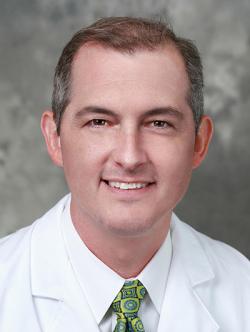
As a gifted surgeon, Dr. Joseph William Turek has done ground-breaking work, performing the world’s first co-transplant of heart and thymus tissue, the world’s first partial heart transplant for a newborn without functioning aortic or pulmonary valves, and led the teams completing the nation’s first pediatric donation after circulatory death (DCD) heart transplant and the first infant DCD heart transplant utilizing normothermic regional perfusion.
During his time as the chief of Duke’s pediatric congenital heart surgery unit, the volume of patients has increased by 80 percent while the risk-adjusted survival rates remain among the best in the nation. Turek has also spearheaded efforts to ensure all children with congenital heart disease in North Carolina have access to quality care by building collaborations with other health care systems.
“His positive energy has really developed a positive work culture within our program,” said nominators and physician assistants Laura Sullivan and Victoria Wildman. “He is truly making a difference in the lives of everyone. … We feel that Joe’s exceptional contributions to the field of congenital heart surgery, to the Duke Health system, to our patients, their loved ones and each other exemplifies our institutional values.”
John Purakal, Assistant Professor, Emergency Medicine, Duke University Medical Center
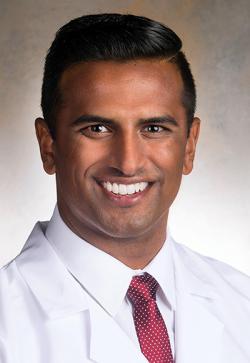
Dr. John Purakal has devoted himself to ensuring emergency medicine patients receive care that goes beyond moments of crisis. Working with students, Purakal developed “ParallelED,” a screening procedure which assists emergency department patients with social needs such as housing, food and transportation. He also helped Duke implement NCCare360, a program from the North Carolina Department of Health & Human Services designed to help patients address social needs through referrals to community organizations. Purakal was recently invited to the White House to share information on his work with other health equity leaders.
A founding member of the Emergency Medicine Department’s Justice, Equity, Diversity & Inclusion Committee, Purakal has also worked to make his department a more inclusive place by developing a health equity curriculum for Duke’s Emergency Medicine Residency Program which features lectures from experts in health disparities. He’s also earned awards from his department colleagues and the American College of Emergency Physicians for his teaching of first- and second-year medical students.
“Dr. John Purakal represents the values our university holds most dear and will continue to be an exemplar of leadership as a clinician, advocate and educator,” wrote nominators Gene Moon, Duke Population Health Management program coordinator, and Debra Jones, Duke Health assistant vice president.
Shanna Fitzpatrick, Senior Associate Dean for Finance and Administration and Chief Financial Officer, The Graduate School

When The Graduate School needed a steady hand to navigate some challenging moments, Shanna Fitzpatrick was up to the task. When the school’s associate dean of admissions post was vacant for a large portion of the past year, Fitzpatrick headed the unit and guided team members through a busy admissions cycle. She handled much of the school’s human resources duties while the human resources manager position was open as well. She also chaired the search committees for both openings.
Fitzpatrick was also instrumental in moving forward initiatives which benefitted graduate students, such as providing dental insurance for purchase. And when Ph.D. stipends were shifted to a 12-month cycle, Fitzpatrick convened a task force to provide recommendations for ways to increase future stipends and ease financial stress for graduate students.
“Shanna has always stepped forward and assumed additional responsibilities when asked, but she has also developed initiatives herself that she feels will benefit The Graduate School and its graduate students,” said former Graduate School Dean and James B. Duke Distinguished Professor of Political Science and Professor of Public Policy Paula McClain, who nominated Fitzpatrick.
Gwendolyn Wright, Director of Strategic Initiatives and Collaboration at the Samuel DuBois Cook Center on Social Equity

Gwendolyn Wright, who has worked at Duke more than 20 years, has always been at the heart of the work of the Samuel DuBois Cook Center on Social Equity.
But recently, her hard work has been particularly important to the center’s successes.
Wright, a dedicated scholar and administrator, was the lead editor of the book “The Pandemic Divide: How COVID Increased Inequality in America” which was published by Duke University Press in November 2022. The book, which included the work of numerous Cook Center researchers and collaborators, examined the pandemic’s effect on inequality.
Wright also organized and planned “The Pandemic Divide” conference in October 2022, which corresponded with the book’s release, and helped the center partner with the Department of History to launch its Inequality Studies minor in 2021.
“The Cook Center’s mission statement describes it as ‘a scholarly collaborative that studies the causes and consequences of inequality and develops remedies for these disparities and their adverse effects,’” wrote Dr. Sandy Darity, the Samuel DuBois Cook Distinguished Professor of Public Policy, African and African American Studies, Economics and Business, in his nomination. “Gwen Wright’s dedication to excellence and efficiency at the Cook Center has been at the base of all the work undertaken to fulfill the spirit of that mission.”
Sheba A. Hall, Administrative Coordinator for the Office of Student Affairs, Medical Education
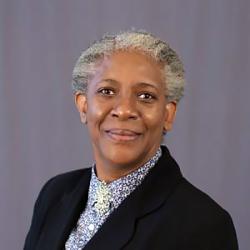
Over 30 years at Duke, Sheba Hall has built a reputation as a trusted colleague and wise resource in the Duke School of Medicine.
Through quiet and dedicated service in the Office of Student Affairs, she carefully manages the sensitive nature of student information, models hard work and has remained adaptable to the changing needs of her work. For example, when the office recently reformed its Medical Student Performance Evaluation, Hall eagerly adjusted to the new policies and procedures.
But her value to Duke is best summed up by her critical role since the pandemic began. In the early days of COVID-19, Hall volunteered to remain on site most days to serve as a resource to students, screen entrants to the building and ensure in-person classes continued. As the pandemic work arrangements evolved, she has remained a consistent part of easing the transition.
“Ultimately, Ms. Hall is the epitome of excellence even as she remains curious and supportive,” wrote nominators Dr. Joseph A. Jackson, associate dean & director, Office of Student Affairs and Jennifer Averitt, associate dean for Medical Education Administration. “She refuses to draw attention to herself and remains the glue that holds the Office of Student Affairs together. Since Ms. Hall is a true inspiration and role model, it is our privilege to nominate her for the Presidential Award.”
Rickie Baker, General Maintenance Mechanic, Facilities Management Department
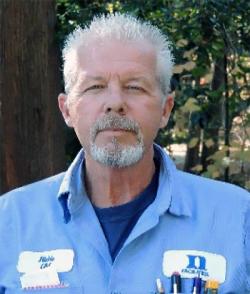
Duke Facilities Management leaders routinely receive emails and phone calls about Rickie Baker and his helpfulness to colleagues on campus.
As a general maintenance mechanic, Baker can repair, solve or mitigate nearly every problem that may arise on campus and he does so with a helpful attitude, contagious smile and listening ear. As the needs of the General Maintenance Shop have increased in the last year, Baker has been a key part of keeping up with requests for maintenance and repairs.
His value includes one example of how he was instrumental in repairing areas around the Duke Lemur Center in 2022 ahead of the dedication of its new The Anna Borruel Codina Center, which allowed staff members who work there to focus their attention elsewhere.
His dependability and caring attitude has made him well-liked by his colleagues and those who need his help at Duke.
“It’s difficult to summarize in limited space all the things Rickie does every day on behalf of the department, because he just does them,” wrote nominators Jim Gortner, assistant director, Building Maintenance and Charles Perea, manager, General Maintenance and Emergency Response. “He shows up every day and gives it his all, he cares about others and is always there to help when needed.”
Emily McGinty, Program Manager at Duke Campus Farm
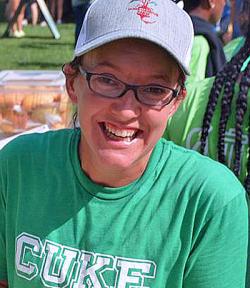
Emily McGinty has dedicated her entire professional life to the Duke Campus Farm with kindness for each person she comes across.
A 2013 graduate of Duke, McGinty has been instrumental in growing the farm, from speaking to stakeholders about its value to bringing five-gallon buckets of water in the back of her car to work before the facility had its own well.
Starting in 2019, in response to racial unrest across the country, McGinty restructured programming to be more welcoming to a diverse population of students and community members. Since the pandemic began, including and centering the voices of Black, Indigenous, and people of color has become a central part of the Campus Farm’s work.
“Emily has a unique ability to make everyone that she comes into contact with feel seen and valued, paying particular attention to those whose work goes largely unseen – the driver who comes to empty the farm’s dumpster, the IT tech, the person behind the cash register,” wrote nominators Saskia Cornes, Duke Campus Farm program director, and Michelle Nowlin, clinical professor of Law and co-director of the Environmental Law and Policy Clinic. “While most of us are happy enough to let this kind of work happen in the background, or offer a courtesy hello, Emily remembers their dog’s name, asks after their ailing spouse, and showers them with farm veggies.”
Send story ideas, shout-outs and photographs through our story idea form or write working@duke.edu.